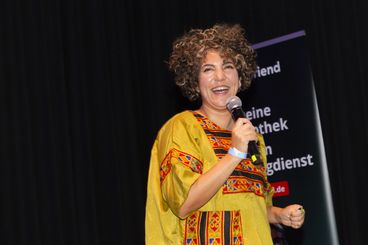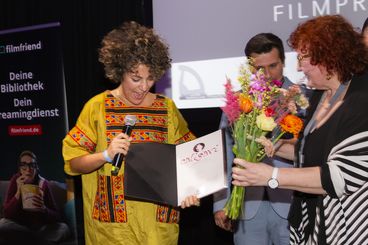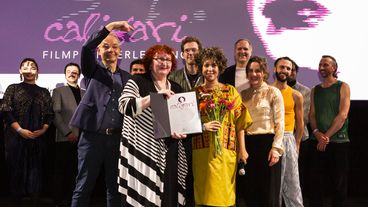The director Narges Kalhor was born in Teheran/Iran in 1984 where she studied directing and visual communication. In 2009, she applied for political asylum in Germany while in the country for a festival. In SHAHID she reflect "performatively and inventively, all while having a lot of fun along the way" the origin of her name and the (his-)stories connected to it.
The Caligari jury statement reads as follows:
"The decision which film should win the Caligari Film Prize this year was both difficult and easy for our jury. It was difficult because, among the thirty films in the Forum's program, there were quite a few that deserved a prize and would have received one under different conditions. However, it was easy because we quickly agreed which of these films impressed us the most in the end: SHAHID by Narges Kalhor.
Narges Shahid Kalhor's life goes in circles. Actually, she just wants to get rid of her first surname, Shahid, which means “martyr” in Iran and thus refers to a history of patriarchal rule and violence. But her path in her new home is blocked by the bureaucracy of the German authorities, while she is literally followed by the long shadow of her ancestors. Just as Narges Kalhor has to find her identity between different countries, cultures and languages, the film constantly switches its own registers with virtuosity: between fiction and documentation; tragedy and comedy; genre cinema and experimental film; slow motion and fast motion; Film, film within the film and behind the scenes. He consistently questions his own form; again and again the fiction becomes fragile and new false bottoms open up. The circular movement turns out to be a spiral into the depths of one's own biography and the collective past.
Shahid is a complex, multi-voiced work and yet unmistakably bears the signature of its director. Narges Kalhor finds expression for her personal experiences in creative collaboration in a wide variety of areas: be it in the unpredictable and cleverly constructed script with co-author Aydin Alinejad, the precise and imaginative camera work by Felix Pflieger, the moving compositions by Marja Burchard, the flowing scene transitions in the editing with Frank Müller, or in the examination of her own role together with her alter ego, played by Baharak Abdolifard.
Our three-person jury has already seen the film at five different screenings at this Berlinale and each time there was laughter loudly and heartily in the cinema. Although the film often tells of difficult and painful experiences, it speaks about these topics with great lightness. That impressed us.
SHAHID is a liberation from the constraints of convention and tradition, a film after which everything seems possible. We are very excited to see what future paths Narges Kalhor will take and congratulate her and her entire team on this work."
SHAHID had its premiere on February 16, 2024 at the Delphi Filmpalast at the Berlinale Forum.
Since 1986, the prize, sponsored by the Kommunale Kinos together with the streaming service filmfriend, has honored a stylistically and thematically innovative film from the Berlinale Forum program. It thus emphasizes the special significance of this section of the Berlin International Film Festival for cultural cinema work in Germany.
The award is endowed with 4,000 euros, half of which goes to the prize-winner, while the other half is used for promotional measures to support cinema distribution throughout Germany after the festival. The 2024 Caligari jury was made up of Maximilian Grenz (Zeughauskino am Deutschen Historischen Museum), Christiane Schleindl (Filmhaus Nürnberg) and Andreas Vogel (filmfriend.de/cinemalovers).



